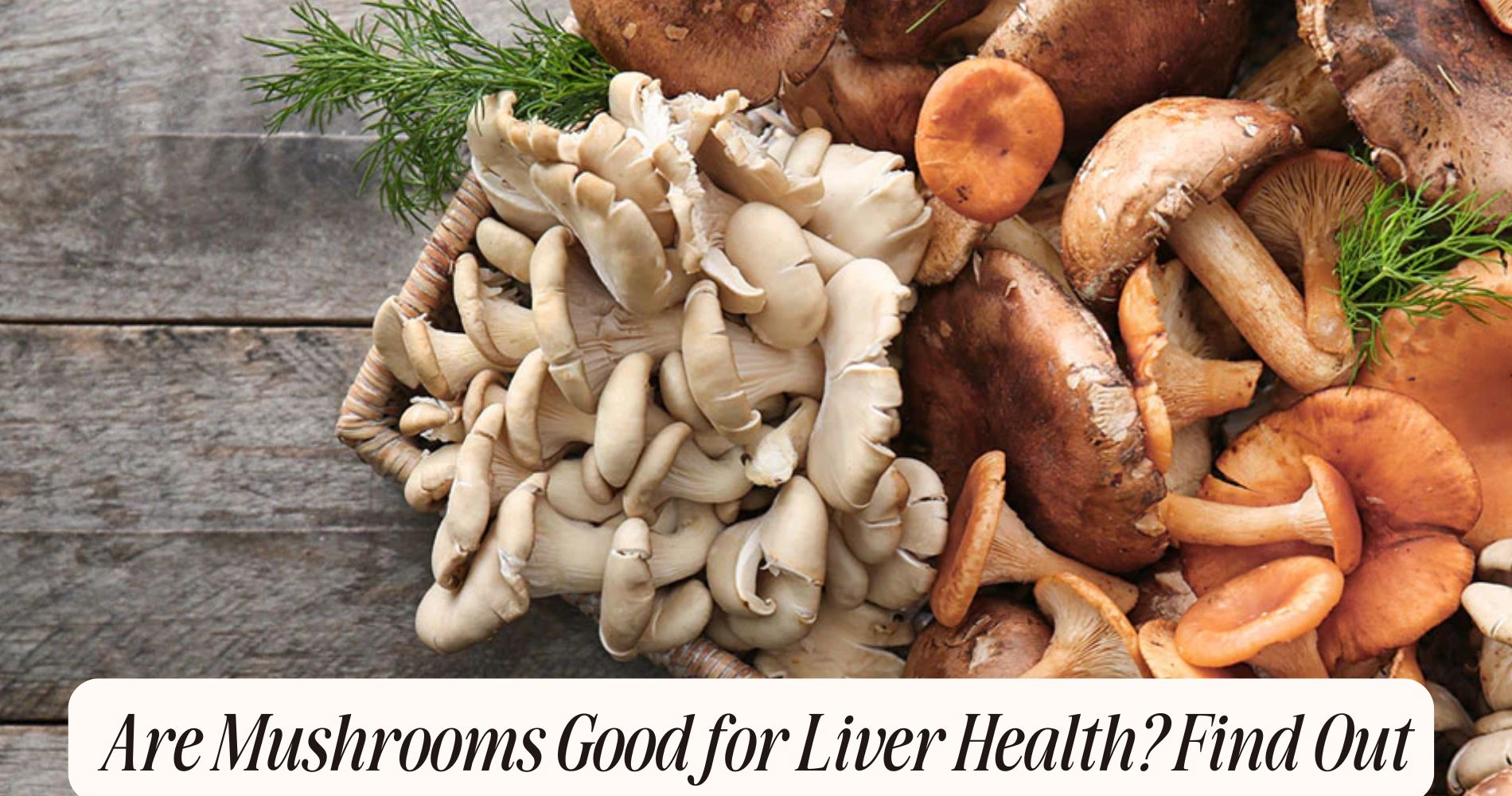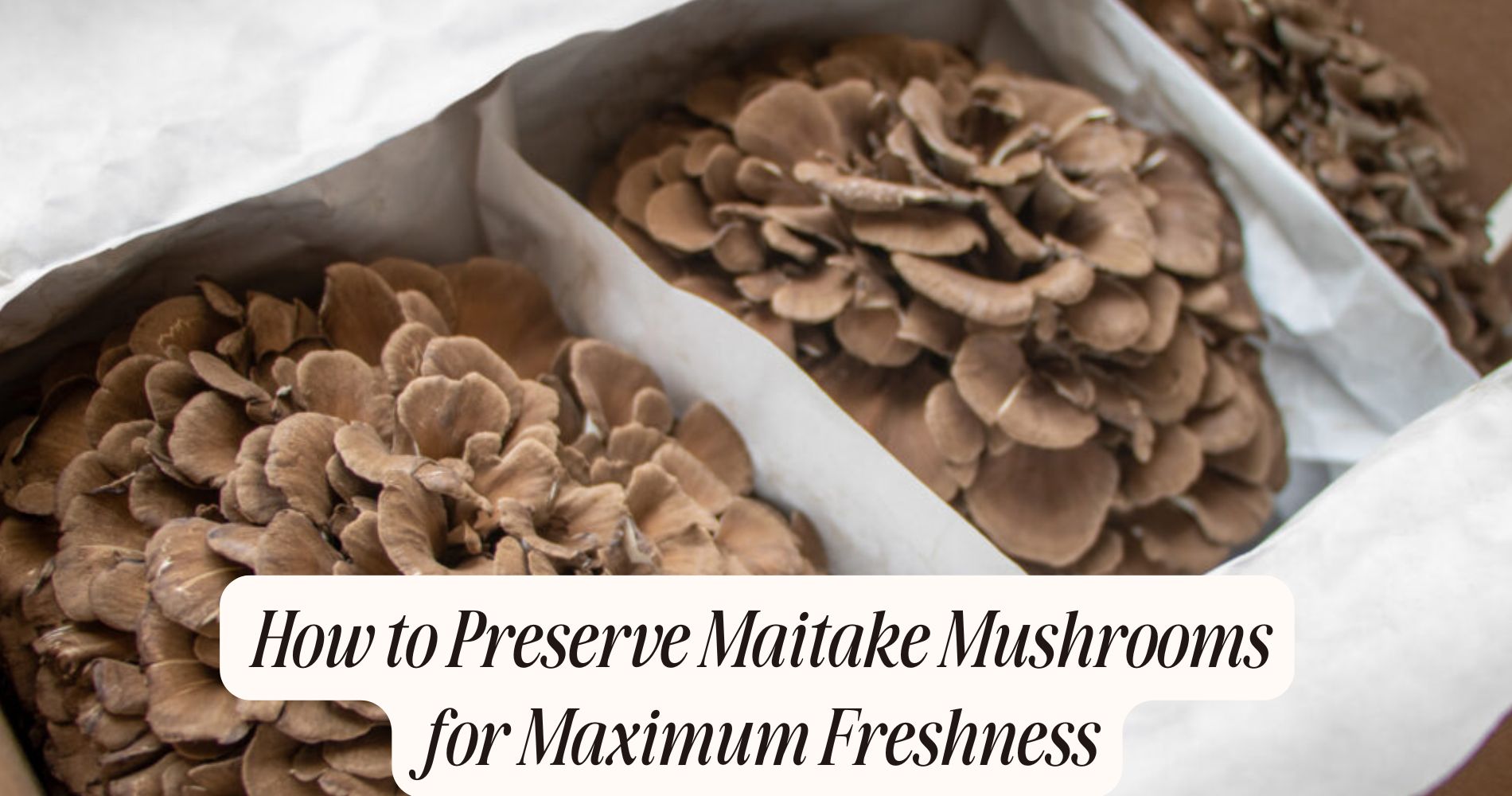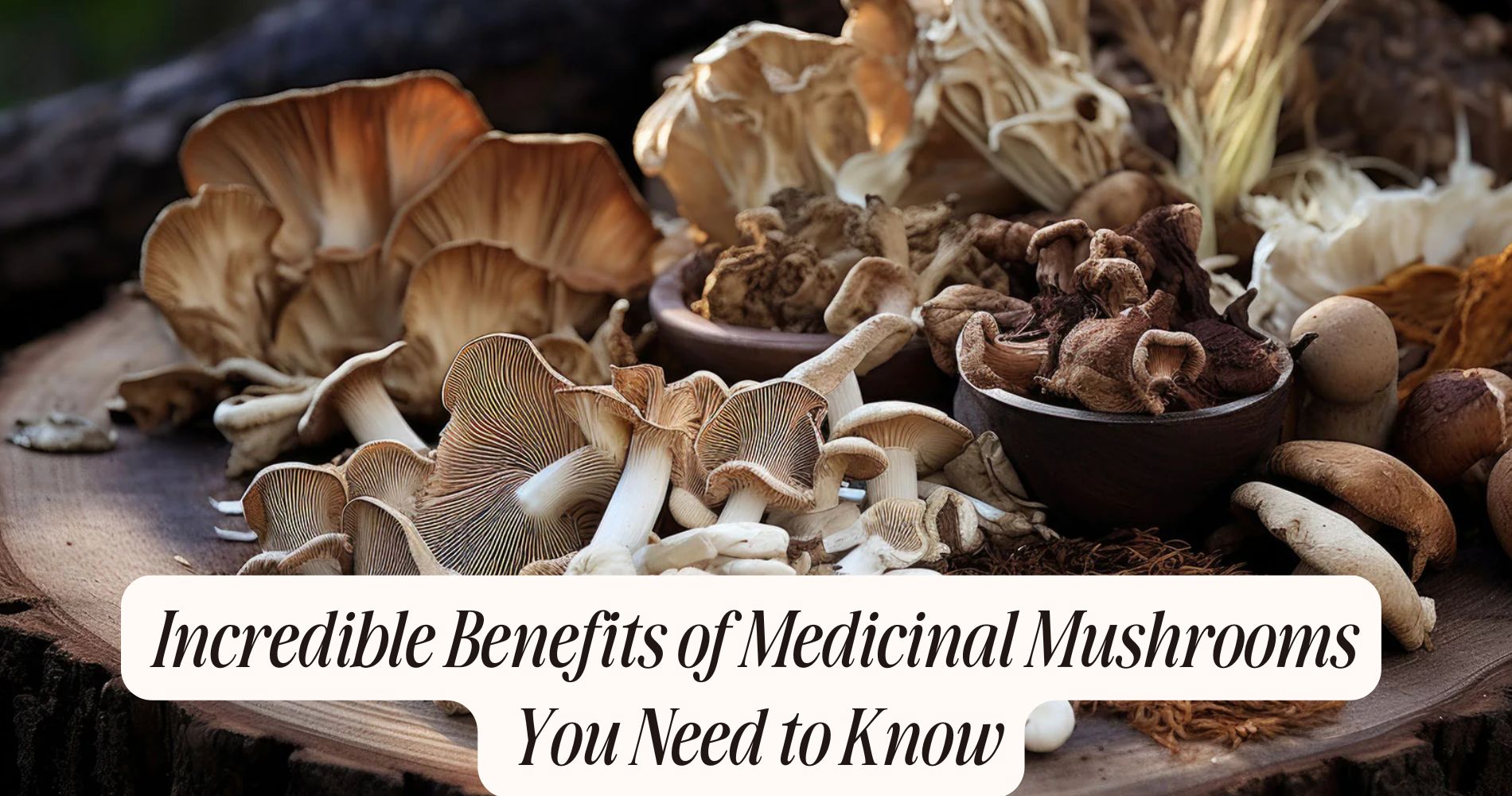
Are Mushrooms Good for Liver Health? Find Out
Are mushrooms good for liver? Mushrooms are excellent for your liver health. They're low in calories and packed with essential nutrients, including powerful antioxidants like ergothioneine and selenium. Varieties such as shiitake and reishi promote liver detoxification and protect against oxidative stress. Research suggests that regular consumption can lower the risk of liver disease, including fatty liver. Polysaccharides found in mushrooms also support immune function, enhancing overall liver protection. By incorporating different types into your meals, you're not just enjoying delicious flavors, but also boosting your liver's health. Curious about specific ways to include these beneficial fungi in your diet? You'll find some great options ahead.
Nutritional Profile of Mushrooms
Mushrooms are a nutritional powerhouse that can greatly benefit your health. Packed with essential nutrients, these fungi offer a unique profile that supports overall wellness. You'll find that different mushroom varieties, such as shiitake, maitake, and reishi, provide distinct health benefits, making them versatile additions to your diet.
One of the standout features of mushrooms is their low calorie content coupled with high nutrient density. They're an excellent source of B vitamins, which play a vital role in energy metabolism and brain function.

Additionally, mushrooms are rich in antioxidants, particularly ergothioneine and selenium, which help combat oxidative stress and inflammation in your body.
Mushrooms also contain polysaccharides like beta-glucans, known for their immune-boosting properties. They can enhance your body's ability to fend off infections and may even support liver health by promoting detoxification processes.
With their unique umami flavor, mushrooms can easily elevate your meals while providing these incredible health benefits. Incorporating a variety of mushrooms into your meals can pave the way for better health and well-being.
Types of Mushrooms and Benefits
When it comes to mushrooms, you'll find a variety of types that offer unique health benefits, especially for your liver.
Medicinal mushrooms like reishi and shiitake are packed with antioxidants and compounds that can support liver function.
Understanding their nutritional benefits can help you make informed choices for your overall health.
Medicinal Mushroom Varieties
In the domain of natural remedies, various types of medicinal mushrooms stand out for their unique health benefits, particularly for liver health. Two of the most notable varieties are lion's mane and reishi extract.
Lion's mane, known for its distinctive appearance, has gained attention for its potential neuroprotective effects. Research suggests it may help support cognitive function, which indirectly benefits liver health by reducing stress and promoting overall well-being.
This mushroom contains bioactive compounds that can enhance the production of nerve growth factor, potentially aiding in liver regeneration.
On the other hand, reishi extract is often celebrated as a powerful adaptogen. It's packed with triterpenes, which are known to help reduce inflammation and oxidative stress—two key factors in liver disease.

Regular consumption of reishi can support immune function, further contributing to liver health.
Incorporating these medicinal mushrooms into your wellness routine may provide significant benefits for your liver. Whether you choose to take them in supplement form or incorporate them into your meals, understanding their unique properties can empower you to make informed decisions for your health.
Nutritional Benefits Overview
Exploring the diverse world of mushrooms reveals a wealth of nutritional benefits that can enhance your overall health. With various mushroom varieties available, each offers unique properties that contribute to liver detoxification and overall well-being.
For instance, shiitake mushrooms are rich in polysaccharides and antioxidants, which help support your immune system and combat oxidative stress.
Similarly, maitake mushrooms contain beta-glucans that can aid in reducing cholesterol levels and improving liver function.
Reishi mushrooms, often called the "mushroom of immortality," are known for their adaptogenic properties, reducing inflammation and promoting liver health.
Lion's mane mushrooms, on the other hand, enhance cognitive function and may protect your liver through their neuroprotective effects.
Incorporating these mushroom varieties into your diet can boost your nutrient intake, providing vitamins, minerals, and fiber that support overall health.
By making mushrooms a regular part of your meals, you can harness their potential benefits for liver detoxification and improve your body's natural processes.
Antioxidants in Mushrooms
Mushrooms are packed with antioxidants that offer significant nutritional benefits, especially for liver health.
These powerful compounds help protect liver cells from damage caused by free radicals, promoting overall organ function.
Nutritional Benefits of Antioxidants
A remarkable array of antioxidants found in various mushrooms can greatly benefit your liver health. These natural compounds help combat oxidative stress, which is essential for maintaining liver function. Mushrooms like shiitake, maitake, and reishi are excellent antioxidant sources, rich in polysaccharides and phenolic compounds that neutralize harmful free radicals.
By incorporating mushrooms into your diet, you can enjoy a range of health benefits. For instance, the antioxidants in these fungi not only reduce inflammation but may also support liver detoxification processes. This means your liver can work more efficiently, filtering toxins and processing nutrients important for your overall health.
Research suggests that these mushrooms can enhance your body's antioxidant defense system, potentially lowering the risk of liver disease and improving overall liver function.
So, whether you sauté them, toss them into salads, or blend them into smoothies, you're doing your liver a favor.
Incorporating these nutrient-packed foods into your meals is a simple yet effective way to harness the health benefits of antioxidants, ultimately contributing to better liver health and well-being.
Protecting Liver Cells
When it comes to protecting liver cells, the antioxidants found in mushrooms play a crucial role. These powerful compounds help combat oxidative stress, which can damage liver cells and hinder their function.
By incorporating mushrooms into your diet, you can tap into a rich source of mushroom bioactive compounds, such as ergothioneine and glutathione, known for their liver-protective properties.

Research shows that these antioxidants support liver cell regeneration, helping your liver recover from damage caused by toxins, alcohol, and poor dietary choices. By neutralizing free radicals, they minimize inflammation and promote overall liver health.
Additionally, certain mushroom varieties, like shiitake and maitake, contain polysaccharides that enhance immune function, further supporting liver health.
This means that not only do mushrooms provide essential nutrients, but they also foster an environment conducive to healing and regeneration.
Mushrooms and Liver Function
Several studies highlight the significant role mushrooms can play in supporting liver function. You might be surprised to learn that certain mushroom compounds, such as polysaccharides and triterpenes, have been shown to enhance liver detoxification processes. These compounds can help your liver efficiently filter and eliminate harmful toxins from your body.
Incorporating mushrooms like reishi, shiitake, and maitake into your diet can provide beneficial effects. Research suggests that these varieties not only promote healthy liver enzymes but also contribute to reducing inflammation, a common concern for liver health.
When your liver is functioning effectively, it's better equipped to metabolize nutrients and dispose of waste effectively.
Moreover, the antioxidants found in mushrooms can protect liver cells from oxidative stress, further aiding in liver function. This protective effect is essential for maintaining overall health and preventing chronic liver diseases.
Research Studies on Liver Health
Research studies highlight the impressive nutrients found in mushrooms that may boost liver health, including their antioxidant properties.
Clinical trials have started to explore these benefits, providing valuable insights into how mushrooms can support liver function.
Mushroom Nutrients and Benefits
Exploring the nutrients found in mushrooms reveals their potential benefits for liver health, making them a valuable addition to your diet. Various mushroom varieties, such as shiitake, maitake, and reishi, are packed with essential vitamins, minerals, and antioxidants that support liver function.
For instance, shiitake mushrooms are rich in polysaccharides, which can enhance your immune response and help your liver detoxify more efficiently.
Research shows that the antioxidants present in these fungi can combat oxidative stress, a major contributor to liver damage. Additionally, certain compounds in mushrooms, like ergothioneine, have been linked to reduced inflammation and improved liver health.
A diet incorporating these mushroom varieties not only provides unique flavors but also delivers significant health benefits.
Moreover, some studies suggest that regular consumption of mushrooms may lower the risk of liver diseases, including fatty liver disease.
By adding mushrooms to your meals, you tap into a natural source of nutrients that may aid liver health while enjoying their delicious taste.
Clinical Trials Overview
Clinical trials have increasingly focused on the impact of dietary components, including mushrooms, on liver health. Researchers employ various clinical trial methodologies to explore how specific mushrooms might influence liver function and overall health. These studies often involve controlled environments where participants consume defined quantities of mushrooms over a specified period while monitoring various health parameters.
One critical aspect of these trials is the measurement of liver disease biomarkers. These biomarkers help assess liver function and the presence of any liver-related conditions. By analyzing changes in these biomarkers, researchers can determine whether mushroom consumption has beneficial effects on liver health. For instance, some studies have reported improvements in liver enzyme levels, indicating better liver function among participants who included mushrooms in their diets.

Moreover, many trials focus on understanding the mechanisms behind these benefits, such as anti-inflammatory and hepatoprotective properties attributed to certain mushroom varieties.
As these studies unfold, they provide valuable insights into how incorporating mushrooms into your diet could support liver health, paving the way for more informed dietary choices in the future.
Antioxidant Properties Explored
Often overlooked, the antioxidant properties of mushrooms play a significant role in promoting liver health. Research shows that various mushroom species, such as shiitake and reishi, contain compounds that activate antioxidant mechanisms in your body. These compounds help neutralize free radicals, which can otherwise lead to oxidative stress and liver damage.
A study published in the journal Food Chemistry found that mushrooms exhibit strong antioxidant activity due to their high levels of polyphenols and other phytochemicals. This antioxidant capacity supports liver detoxification, allowing your liver to efficiently eliminate toxins and harmful substances.
Additionally, a clinical trial highlighted the potential of specific mushrooms in reducing liver inflammation, further underscoring their protective effects.
Potential Risks of Mushroom Consumption
While mushrooms are celebrated for their nutritional benefits, it's crucial to recognize that not all varieties are safe for consumption. Some mushrooms are toxic and can cause severe health issues, including liver toxicity. For instance, the infamous Amanita phalloides, or death cap mushroom, is responsible for numerous poisonings and can lead to irreversible liver damage.
Moreover, allergic reactions can occur in some individuals, resulting in symptoms like skin rashes, gastrointestinal distress, or even respiratory issues. If you're new to mushroom consumption, it's wise to start with small portions to gauge your body's response.
Another concern is mushroom contamination. Mushrooms can absorb toxins from their environment, including heavy metals and pesticides, which can pose significant health risks. Always buy from reputable sources and consider organic options to minimize exposure to harmful substances.
To protect your health, educate yourself about the types of mushrooms you're consuming. It's crucial to avoid wild mushrooms unless you're certain of their safety, as misidentification can lead to serious consequences.
How to Incorporate Mushrooms
How can you easily add mushrooms to your meals for maximum health benefits? Incorporating various mushroom varieties into your diet can be both delicious and nutritious. Start by exploring different types, like shiitake, portobello, and oyster mushrooms, each offering unique flavors and health benefits.
You can enhance your dishes with mushrooms using simple cooking techniques. Sauté them in olive oil or butter to bring out their rich umami flavors. Add them to stir-fries for a hearty texture, or toss them into salads for a fresh, earthy crunch.
Roasting mushrooms can intensify their taste, making them a fantastic addition to grain bowls or pasta dishes.
Don't forget about soups! Adding sliced mushrooms to your broth can elevate the flavor while boosting its nutritional profile. If you're feeling adventurous, try grilling or baking stuffed mushrooms for a savory snack or appetizer.
Recipes Featuring Mushrooms
Incorporating mushrooms into your meals opens up a world of culinary possibilities that not only enhance flavor but also boost your liver health.
One delicious way to enjoy mushrooms is through a vibrant mushroom stir fry. Start by sautéing a mix of your favorite vegetables—like bell peppers and broccoli—in olive oil. Add sliced mushrooms, garlic, and ginger for a savory kick. Finish it off with a splash of low-sodium soy sauce and serve it over brown rice for a nutritious, liver-friendly meal.
Another delightful option is stuffed mushrooms. Choose large portobello or cremini mushrooms, remove the stems, and prepare a filling using cream cheese, spinach, garlic, and a sprinkle of nutritional yeast for added flavor.
Stuff the mushroom caps generously, then bake them at 375°F (190°C) for about 20 minutes until golden and bubbly. These stuffed mushrooms make for a perfect appetizer or a side dish, packed with nutrients and flavor.
Other Foods for Liver Health
Maintaining liver health involves more than just enjoying mushrooms; a variety of other foods can greatly contribute to your liver's well-being. Incorporating leafy greens into your diet is a fantastic way to support your liver. Greens like spinach, kale, and arugula are rich in antioxidants and nutrients that help detoxify the liver and promote overall health.

Don't overlook the power of herbal teas either. Herbal varieties, such as dandelion root and milk thistle, are known for their liver-supporting properties. Dandelion root can stimulate bile production, aiding in digestion and detoxification, while milk thistle contains silymarin, which may protect liver cells from damage.
Additionally, consider adding foods high in healthy fats, like avocados and olive oil. These fats can help reduce inflammation and support liver function.
Whole grains, nuts, and seeds also play a role by providing essential nutrients and fiber, promoting better digestion.
Final Thoughts on Mushrooms
Mushrooms can be a powerful ally in your quest for liver health. Rich in antioxidants and anti-inflammatory compounds, culinary varieties like shiitake, maitake, and reishi have shown potential in supporting liver function.
These mushrooms not only enhance your meals but can also contribute to detoxification processes, helping your liver work more efficiently.
When incorporating mushrooms into your diet, consider their sustainability. Many mushroom species are cultivated using eco-friendly practices, making them a smart choice for both your health and the environment.
By choosing sustainably sourced mushrooms, you're supporting responsible farming practices that minimize environmental impact.
It's essential to explore the diverse culinary varieties available. Each type brings unique flavors and textures to your dishes, as well as different health benefits.
Whether you're sautéing them in a stir-fry or adding them to soups, mushrooms can be a delicious and nutritious addition to your diet.
Frequently Asked Questions
Can Mushrooms Help Detoxify the Liver?
Mushroom varieties, like shiitake and reishi, can support liver detoxification. They contain antioxidants and compounds that help reduce inflammation, promoting overall liver health while assisting your body in eliminating toxins more effectively.
Are There Specific Mushrooms for Liver Diseases?
Yes, certain medicinal mushrooms like reishi and cordyceps offer liver support. They contain compounds that may help reduce inflammation and enhance detoxification, making them beneficial for those dealing with liver diseases. Always consult a healthcare professional first.
How Often Should I Eat Mushrooms for Liver Health?
For liver health, you should enjoy mushroom varieties like shiitake or maitake two to three times a week. A serving size of about one cup cooked can provide beneficial nutrients while enhancing your diet.
Can Mushroom Supplements Benefit Liver Function?
Mushroom supplements can enhance liver function by supporting liver enzymes. Varieties like lion's mane and reishi are particularly beneficial, as they may help protect against damage and improve overall liver health. Incorporate them into your routine!
Are There Any Side Effects of Eating Mushrooms for the Liver?
While most mushrooms are safe, some can cause mushroom toxicity, negatively impacting liver function. It's essential to identify edible varieties and avoid wild mushrooms unless you're certain of their safety to protect your liver health.
Conclusion
Incorporating mushrooms into your diet can be a tasty way to support liver health. Their rich nutritional profile, antioxidants, and potential benefits for liver function make them a smart choice. Whether you enjoy them sautéed, in soups, or as part of a hearty dish, these fungi can enhance your meals while promoting overall wellness. Don't forget to explore other liver-friendly foods alongside mushrooms for a balanced approach to your health!




